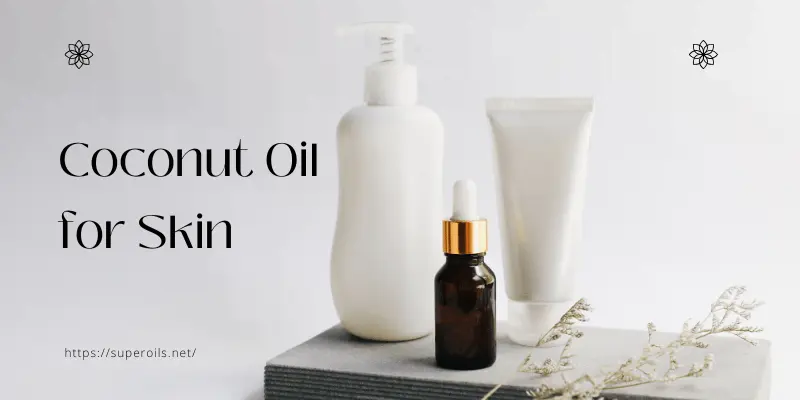Coconut Oil for Skin: Tips for Best Results
Published: 10 Jan 2025
Coconut oil for skin has become a favorite natural remedy in recent years. Packed with vitamins, antioxidants, and fatty acids, it offers a wide range of benefits for your skin. From moisturizing dry patches to reducing signs of aging, this versatile oil has earned its place in many skincare routines.
For a broader overview of natural oils, check out this Skincare Oils Guide for more options that complement coconut oil.
Benefits of Coconut Oil for Skin
Coconut Oil for Skin offers numerous benefits that make it a popular choice in natural skincare routines. From moisturizing to protecting, it helps keep your skin healthy and nourished.
Advantages:
- Deeply moisturizes dry skin
- Reduces the appearance of wrinkles
- Heals sunburns and other skin irritations
- Provides natural antibacterial and antifungal protection
- Helps soothe eczema and psoriasis
- Works as a gentle makeup remover
- Promotes smoother and softer skin
- Can be used as a natural lip balm

How to Use Coconut Oil for Skin
Using Coconut Oil for Skin is simple and effective. Follow these steps for the best results:
- Start with clean, dry skin.
- Warm a small amount of coconut oil in your hands to melt it into a liquid.
- Gently massage the oil into your skin using circular motions.
- For the face, apply lightly and avoid the eye area to prevent irritation.
- For body use, focus on dry or rough areas like elbows and knees.
- Leave the oil to absorb for a few minutes before dressing.
- For makeup removal, apply the oil to a cotton pad and gently wipe off makeup.
Coconut oil is a natural powerhouse for skin hydration. Its rich fatty acids penetrate deeply, making it ideal for dry skin, while its antibacterial properties offer added protection.– Dr. Jane Smith, Dermatologist and Natural Skincare Advocate
Tips for Choosing the Right Coconut Oil
Tips for Choosing the Right Coconut Oil involve selecting high-quality, pure oil to maximize its skin benefits. Look for organic, virgin coconut oil that’s free of added chemicals or fragrances. It should be cold-pressed to ensure it retains all its natural nutrients. This ensures you’re using the best oil to nourish and protect your skin.
Conclusion
So guys, in this article, we’ve covered Coconut Oil for Skin in detail. From its many benefits to the best ways to use it, coconut oil truly is a powerhouse in skincare. I highly recommend trying it if you’re looking for a natural and effective way to improve your skin’s health.
Start with a small amount to see how your skin reacts and incorporate it into your daily routine. If you haven’t already, give it a try and see the results for yourself!
FAQs
Yes, coconut oil can be used on most skin types, but it’s important to test it first, especially for sensitive or acne-prone skin. If you have oily skin, use it sparingly. For dry skin, it works great as a moisturizer.
Coconut oil has antibacterial properties, but it can clog pores for some people, especially those with acne-prone skin. If you want to try it, apply a small amount and monitor how your skin reacts. It’s best used on dry or mature skin.
You can apply coconut oil daily, especially if you have dry skin. For best results, use it after showering to lock in moisture. Adjust the frequency depending on how your skin feels.
Coconut oil is generally safe for sensitive skin, but it’s always a good idea to do a patch test first. Apply a small amount on your wrist and wait 24 hours to check for any reactions. If it causes irritation, discontinue use.
Yes, coconut oil can be used on the face, but use it sparingly, especially if you have oily or acne-prone skin. It works well as a makeup remover or moisturizer. Avoid the eye area to prevent irritation.
Yes, coconut oil’s antioxidants and fatty acids help reduce the appearance of wrinkles and fine lines. It deeply moisturizes, keeping the skin soft and plump. Apply a small amount to affected areas at night for best results.
Virgin coconut oil is made from fresh coconut meat and is unrefined, retaining more nutrients. Refined coconut oil is processed and may lose some of its beneficial properties. For skincare, virgin coconut oil is the better option.
Yes, coconut oil can soothe sunburns due to its moisturizing and anti-inflammatory properties. It helps heal the skin and reduces redness. Apply it gently to affected areas after the skin cools down.
Look for organic, virgin, and cold-pressed coconut oil for the highest quality. Avoid oils with added chemicals or fragrances. Choose unrefined coconut oil to get the full benefits for your skin.
Coconut oil may leave a slight residue on the skin, especially if applied in excess. If you have oily skin, use it sparingly, focusing on dry areas. For most people, it works well as a moisturizer when used correctly.
